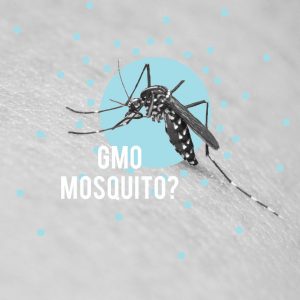GMOs. They’re a hot topic and have been for quite a while. When most people think about GMOs or “genetically modified organisms”, they think about their food, but have you ever thought about a genetically modified mosquito?
Let’s start by briefly talking about what a GMO is. A GMO is an organism that has had its DNA or genetics altered in some way through genetic engineering. In most cases, this is done by taking the DNA from another organism and inserting it into the DNA of the organism that is being modified. This modern day definition of GMOs, or an alteration that’s taking place at an individual gene level, generally takes place within a lab. However, the truth is that humans have been creating GMOs long before we even knew what DNA was. Back then, it was simply called farming. For hundreds of thousands of years, farmers have been selecting crops that have the highest yield, the tastiest fruits, cows with the highest meat/milk production, etc. and have been breeding them to create organisms that are genetically modified and more suited to our needs. It’s the main reason why modern day corn looks so different from its original plant, teosinte.
Let’s bring it back to the mosquito. Mosquitoes have long been a menace to the survival and public health of the human race. They’re the carriers of deadly diseases like malaria, yellow fever, dengue, West Nile virus, and the most recent virus: Zika. The Zika virus became a public health crisis in 2015 and has since been a major concern for populations that live in warmer climates and especially women who are capable of giving birth. But how do you fight a virus that spreads via mosquitoes? The biotechnology firm Oxitec has an answer…you genetically modify them.

The idea is simple. You take the eggs of mosquitoes and inject them with DNA that is ultimately lethal, hatch and release the males from those eggs and have them mate with females in the wild to create offspring that won’t be able to survive to adulthood due to the modification. The males don’t bite, so there’s no chance of transferring genes horizontally to other organisms. Plus, targeting the species so specifically should have a much smaller impact than say spraying pesticides willy nilly or releasing invasive species to help control the mosquito population (something that has never worked in other scenarios). Preliminary tests have shown a reduction in mosquito populations by 80%. That’s a pretty significant number, but scientists still aren’t sure whether or not those numbers are big enough. As long as mosquitoes exist, they’ll continue to transmit diseases, raising the question whether we have the right to destroy a species to ensure the health and survival of ourselves.
This method wouldn’t be the first time we’ve used genetics to destroy a species for our benefit and it certainly wouldn’t be the first time we’ve had a part in the extinction of species. What would the extinction of mosquitoes mean? Scientist still aren’t sure. But one thing is certain, even those who are wary of GMOs are behind modifying mosquitoes to save us from Zika and other nasty viruses. Compared to pesticides or being infected by the virus, genetic modification is the lesser of two evils. In fact, in a poll conducted by Purdue University, nearly 78% of those polled said they were in favor of using genetically modified mosquitoes to help fight the spread of the Zika virus. The fact is that GMOs don’t seem so scary when they could help save us. While these new “designer mosquitoes” could save hundreds if not thousands of lives, what does this mean for the future of ecology? Can we really trust ourselves with the power to modify other creatures simply to benefit ourselves? It’s a great question to ponder and another reason why the science of genetics and DNA is so fascinating.

